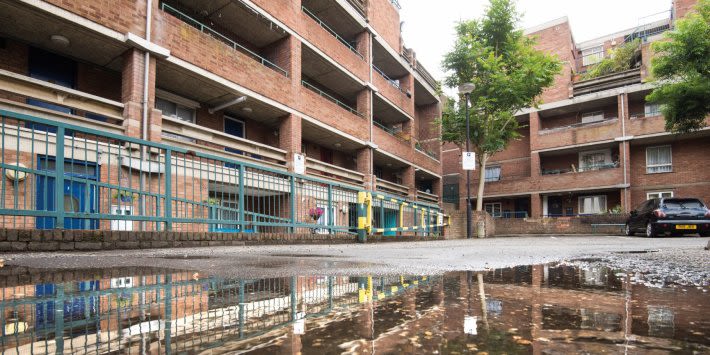Robert Jenrick vows to ‘cut red tape’ with major planning shake-up — but Labour brand it a ‘developer’s charter’ amid social housing warning
The Housing Secretary said the new proposals would place a ‘higher regard on quality, design and the environment than ever before’. (PA images)
5 min read
A host of changes to England’s planning system will “cut red tape, but not standards”, Robert Jenrick has claimed, as critics accused the Government of weakening social housing requirements.
A sweeping reform of house-building rules will see three new categories of land earmarked in a bid to speed up the creation of new homes — alongside the scrapping of current local affordable housing rules.
Developers will be granted “automatic” permission to build on sites marked out for ‘growth’, in a move the Government says will allow new homes, schools, shops and business spaces to be built “quickly and efficiently, as long as local design standards are met”.
A second category — ‘renewal’ — will allow sped-up development if a project is “well-designed in a way which reflects community preferences”.
Meanwhile land marked as ‘protected’ will be restricted from development, with councils retaining the ability to decide whether building can go ahead.
"As we face the economic effects of the pandemic, now is the time for decisive action and a clear plan for jobs and growth" - Housing Secretary Robert Jenrick
Speaking as the Government published its white paper to consult on the plans, the Housing Secretary said: “Our complex planning system has been a barrier to building the homes people need; it takes seven years to agree local housing plans and five years just to get a spade in the ground.
"These once in a generation reforms will lay the foundations for a brighter future, providing more homes for young people and creating better quality neighbourhoods and homes across the country.
“We will cut red tape, but not standards, placing a higher regard on quality, design and the environment than ever before. Planning decisions will be simple and transparent, with local democracy at the heart of the process.”
And Mr Jenrick added: "As we face the economic effects of the pandemic, now is the time for decisive action and a clear plan for jobs and growth.
“Our reforms will create thousands of jobs, lessen the dominance of big builders in the system, providing a major boost for small building companies across the country."
SECTION 106 ROW
The Government is promising that local communities will be consulted from the start of the planning process, with online maps and data used to make the process more accessible.
More building on brownfield land will be permitted, it says, and local housing plans will have to be developed and agreed in 30 months, down from the current average of seven years.
A “clearer, rules based system” will replace the existing planning process, ministers say.

But housing charity Shelter has slammed the Government’s proposal to replace Section 106 agreements, which are used by councils to commit developers to building a certain proportion of affordable and social housing.
Ministers say Section 106, as well as the Community Infrastructure Levy that developers pay to councils to support local infrastructure, “will be replaced with a new Infrastructure Levy that will be a fixed proportion of the value of the development” and could be spent locally on roads, playgrounds and discounted homes for first-time buyers.
“These proposals will only serve to blight communities with a new wave of slum housing" - Shadow planning minister Mike Amesbury
But Shelter’s chief executive Polly Neate warned: “Section 106 agreements between developers and councils are tragically one of the only ways we get social homes built these days, due to a lack of direct government investment. So, it makes no sense to remove this route to genuinely affordable homes without a guaranteed alternative.
“The government says it wants to build beautiful, but that cannot be only for a fortunate few.”
She added: “Struggling renters and key workers with no savings face being left behind.
“This pandemic has shown us the importance of safe home like nothing before, but a safe home will remain a pipe dream for too many if the government fails to invest in social housing. Cutting up the planning system must not result in cutting social homes.”
Shadow Housing and Planning Minister Mike Amesbury (pictured) meanwhile said: “This is a Developer’s Charter that will see communities side-lined in decisions and denied vital funding for building schools, clinics and community infrastructure."

The Labour frontbencher added: “These proposals will only serve to blight communities with a new wave of slum housing – the Government’s own independent report even warned of the poor quality of housing built outside the planning system.
“This Government needs to build the high-quality, genuinely affordable, environmentally sustainable housing that this country desperately needs.”
And Green MP Caroline Lucas said the “bonfire of planning laws” would amount to a “green light for the Tories’ developer friends to build whatever and wherever they want, with almost no thought for sustainability or protection of the environment and nature”.
'LOSS OF LOCAL CONTROL'
The Local Government Association, which represents councils, meanwhile urged the Government to ensure it maintained “a locally-led planning system which gives communities the power to ensure new developments are of a high standard, built in the right places, and include affordable homes”.
LGA chairman James Jamieson said: “Nine in 10 applications are approved by councils with more than a million homes given planning permission over the last decade yet to be built. The system needs to ensure planning permissions are built.
“Any loss of local control over developments would be a concern. It would deprive communities of the ability to define the area they live in and know best and risk giving developers the freedom to ride roughshod over local areas.”
But the proposals have been welcomed by developer Gleeson Homes, which said it “strongly” supported the planning shake-up.
Chief executive James Thomson said: “In particular, we welcome initiatives to make it more transparent, speed up planning where appropriate and has a presumption towards development rather than against.
“The renewed commitment to building 300,000 new homes a year is an important goal and will be aided by these new initiatives.”
